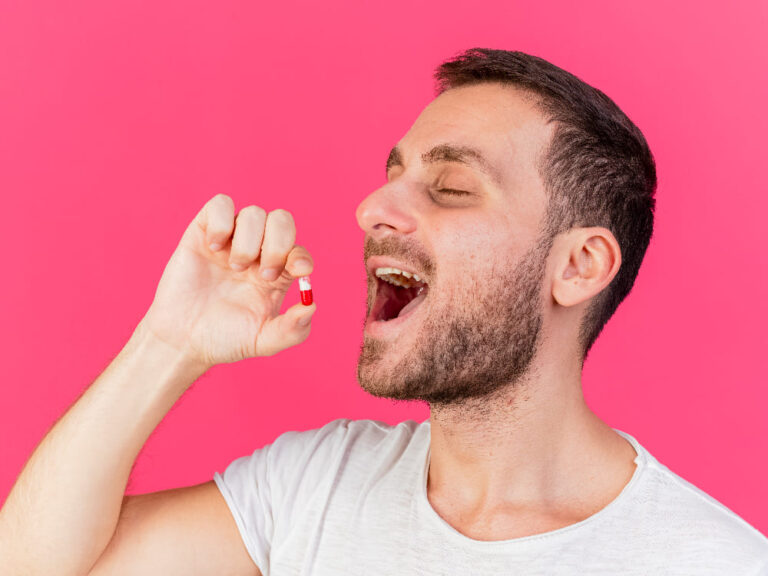How Masturbation Reduces Stress and Improves Your Mood: The Science Behind Self-Pleasure and Mental Health

The Connection Between Masturbation and Stress Relief
Masturbation has long been recognized as a natural form of stress relief. When engaging in this self-pleasuring act, the body releases endorphins, which are known as the “feel-good” hormones. These endorphins help to boost mood and reduce feelings of stress and anxiety. In addition to endorphins, masturbation also stimulates the release of oxytocin, often referred to as the “love hormone,” which promotes feelings of relaxation and contentment.
Moreover, masturbation has been found to have a positive impact on mental health. Studies have shown that engaging in regular self-stimulation can help to alleviate symptoms of depression and anxiety. The release of dopamine, a neurotransmitter associated with pleasure and reward, during masturbation, may contribute to this mental health benefit. Dopamine helps to improve mood and increase feelings of pleasure and satisfaction. By incorporating masturbation into their self-care routine, individuals may experience a significant reduction in stress levels and an overall improvement in mental well-being.
Understanding the Impact of Masturbation on Mental Health

Masturbation is a natural and common sexual activity that is often associated with pleasure and release. However, its impact on mental health is a topic that has received increasing attention in recent years. Numerous studies have explored the potential benefits of masturbation on mental well-being and have shed light on the ways in which it can positively impact various aspects of psychological health.
One significant finding is the potential role of masturbation in stress reduction. Research suggests that engaging in solo sexual activity can help to alleviate anxiety and tension, providing a natural and effective way to relax the mind and body. This is thought to be due to the release of endorphins, which are neurotransmitters known to promote feelings of pleasure and euphoria. Additionally, the act of masturbation may contribute to improved sleep quality, further enhancing overall well-being. Understanding the impact of masturbation on mental health is crucial in recognizing the potential benefits it offers in promoting emotional stability and reducing stress. It is essential, however, to approach this topic with sensitivity and respect, recognizing that individual experiences and perspectives may vary.
Exploring the Role of Dopamine in Mood Enhancement through Masturbation
Dopamine, a neurotransmitter known for its role in pleasure and reward, plays a significant role in mood enhancement through masturbation. When engaging in self-stimulation, the body releases dopamine, which promotes feelings of pleasure and satisfaction. This surge of dopamine results in an improved mood, reducing stress and anxiety levels.
Research has shown that dopamine not only contributes to the pleasure experienced during masturbation but also enhances overall mood. Studies have found that dopamine release during sexual arousal and orgasm can lead to feelings of euphoria and increased happiness. This mood-enhancing effect can help individuals combat stress and alleviate symptoms of depression.
Furthermore, the release of dopamine during masturbation can also have a positive impact on motivation and focus. Dopamine is closely linked to the brain’s reward system, and its release can strengthen the brain’s association between pleasurable activities and feelings of satisfaction. This association can contribute to an increased motivation to engage in other rewarding activities, leading to a more productive and balanced mindset.
While the role of dopamine in mood enhancement through masturbation is well-documented, it is essential to maintain a balanced approach. Understanding the complexities of mental health and the multifaceted nature of dopamine’s effects is crucial. Further research is needed to explore the long-term impact of dopamine release during masturbation on mental health and emotional well-being. Additionally, individuals should consult with healthcare professionals for personalized advice and support regarding their mental health concerns.
The Release of Endorphins: How Masturbation Boosts Your Mood

When it comes to boosting mood, one natural method that often goes overlooked is masturbation. The act of self-stimulation has been found to release endorphins in the brain, which are known as the body’s “feel-good” chemicals. Endorphins play a crucial role in regulating emotions and reducing pain, and their release during masturbation can lead to an instant mood lift.
Research suggests that the release of endorphins during masturbation can have a range of positive effects on mood. A study published in the Archives of Sexual Behavior found that individuals who engaged in regular masturbation reported higher levels of well-being and overall happiness. Another study published in the Journal of Sexual Medicine found that masturbation was associated with a decrease in symptoms of depression and anxiety. These findings highlight the powerful impact that endorphins have on our mental state and the potential benefits of masturbation as a mood booster.
Masturbation as a Natural Stress Reliever: How It Helps to Relax the Mind and Body
Masturbation is a common and natural sexual activity that many individuals engage in for various reasons. One of the benefits of masturbation is its ability to help relieve stress and relax the mind and body. When a person engages in masturbation, the body releases endorphins – chemicals in the brain that act as natural painkillers and mood enhancers. These endorphins not only create feelings of pleasure and satisfaction but also help to reduce stress and anxiety.
Additionally, masturbation can promote relaxation by triggering the body’s relaxation response. This response is characterized by a decrease in heart rate, blood pressure, and muscle tension, while also increasing feelings of calmness and well-being. Furthermore, the release of oxytocin, often referred to as the “love hormone,” during orgasm can contribute to a sense of deep relaxation and emotional bonding. These physiological effects of masturbation can help individuals unwind after a stressful day and provide a much-needed break for the mind and body.
The Psychological Benefits of Masturbation: Increased Self-Confidence and Improved Body Image
Masturbation not only provides physical pleasure but also has psychological benefits. One of these benefits is increased self-confidence. Engaging in self-pleasure allows individuals to explore their own bodies and become more comfortable with their sexuality. This self-exploration can boost self-confidence by helping individuals understand their sexual preferences and desires, leading to a stronger sense of self-awareness.
Moreover, masturbation can contribute to improved body image. When individuals engage in self-pleasure, they are focused on their own pleasure and enjoyment, without the pressure of meeting someone else’s expectations. This self-focused act can help individuals develop a positive relationship with their own bodies, promoting body acceptance and reducing body insecurities. By experiencing pleasure and satisfaction with their bodies during masturbation, individuals may develop a healthier and more positive body image overall.
In conclusion, masturbation offers psychological benefits in terms of increased self-confidence and improved body image. Engaging in self-pleasure allows individuals to explore and understand their own bodies, leading to heightened self-awareness and a stronger sense of identity. Additionally, the act of masturbation promotes body acceptance and reduces insecurities, fostering a positive and nurturing relationship with one’s own body.
Exploring the Role of Serotonin in Masturbation and Mood Regulation
Serotonin, often referred to as the “feel-good” neurotransmitter, plays a crucial role in regulating mood and emotions. It is responsible for transmitting signals between nerve cells and is found in various parts of the body, including the brain and gastrointestinal tract. When it comes to masturbation and mood regulation, serotonin levels can be impacted in several ways.
One of the primary ways that masturbation influences serotonin levels is through the release of endorphins. During sexual stimulation and orgasm, the body releases endorphins, which are natural painkillers and mood boosters. These endorphins interact with serotonin receptors in the brain, leading to increased feelings of pleasure and a temporary improvement in mood. Moreover, serotonin itself is released during sexual activity, further enhancing the positive effects on mood regulation. This intricate interplay between serotonin and endorphins during masturbation contributes to the overall sense of well-being and relaxation that individuals often experience.
Here’s a short data table on exploring the role of serotonin in masturbation and mood regulation:
| Serotonin in Masturbation and Mood Regulation | Key Concepts | Credible Source |
|---|---|---|
| Serotonin’s Mood-Regulating Function | – Key Concept: Serotonin is a neurotransmitter associated with mood regulation, contributing to feelings of well-being and happiness. | Psychology Today – Serotonin and Its Roles |
| – Considerations: Maintaining balanced serotonin levels is crucial for overall mental health. | ||
| Serotonin Release During Masturbation | – Key Concept: Masturbation can lead to the release of serotonin, providing a temporary boost in mood and relaxation. | Frontiers in Psychology – Sexual Activity and Mood |
| – Considerations: The pleasure associated with sexual activity involves various neurotransmitters, including serotonin. | ||
| Impact of Masturbation on Stress Reduction | – Key Concept: Masturbation, through serotonin release and endorphin production, may contribute to stress reduction and improved mood. | Mayo Clinic – Masturbation and Stress |
| – Considerations: Healthy sexual activities can be a part of stress management strategies. | ||
| Individual Variations in Serotonin Response | – Key Concept: The relationship between serotonin, masturbation, and mood can vary among individuals due to factors like genetics and overall mental health. | Neuropsychobiology – Individual Differences in Serotonin Response |
| – Considerations: Personal factors influence how serotonin contributes to mood regulation in different individuals. | ||
| Serotonin’s Role in Mental Health | – Key Concept: Maintaining optimal serotonin levels is essential for mental health, and imbalances may be associated with mood disorders. | National Institute of Mental Health – Serotonin and Mental Health |
| – Considerations: Serotonin plays a broader role in mental well-being beyond its involvement in sexual activities. |
Masturbation and Stress Reduction: How It Helps to Alleviate Anxiety and Tension
Stress and anxiety are common challenges that many individuals face in their daily lives. While there are various methods to manage these feelings, one lesser-known but effective approach is masturbation. Masturbation, the act of self-stimulation for sexual pleasure, has been found to have a positive impact on alleviating anxiety and tension.
One of the primary reasons behind the stress-relieving effects of masturbation is the release of endorphins. Endorphins are neurotransmitters produced by the brain that help to reduce pain and promote feelings of pleasure. During masturbation, the body releases endorphins, which can create a sense of calm and relaxation. This natural boost in mood can be highly beneficial for individuals experiencing stress or anxiety, providing them with temporary relief and a welcome sense of well-being.
Furthermore, masturbation has been associated with the regulation of certain hormones, such as cortisol. Cortisol is a hormone released by the body in response to stress and is known as the “stress hormone.” Studies have shown that engaging in sexual activity, including masturbation, can reduce cortisol levels, resulting in a decrease in stress and anxiety. By helping to balance hormone levels, masturbation aids in the restoration of emotional equilibrium, allowing individuals to better cope with the challenges of daily life.
In conclusion, masturbation has been found to be a valuable tool in managing stress and anxiety. Through the release of endorphins and the regulation of hormones such as cortisol, masturbation provides individuals with a natural and accessible means of finding temporary relief from these debilitating feelings. Incorporating this practice into one’s self-care routine may help promote overall well-being and contribute to a more balanced and emotionally stable life.
The Science Behind Masturbation and Improved Sleep Quality
Masturbation, a natural and common sexual activity, has been observed to have potential benefits for improving sleep quality. While the relationship between masturbation and sleep has not been extensively studied, there are several mechanisms through which it may have a positive impact.
One possible explanation is the release of endorphins, which are known to promote relaxation and induce feelings of pleasure. Masturbation can trigger the release of these endorphins, leading to a sense of calmness and contentment that can potentially aid in falling asleep. Additionally, the release of dopamine, a neurotransmitter associated with reward and pleasure, during masturbation may also contribute to improved sleep quality. Dopamine has been linked to regulating the sleep-wake cycle and promoting sleep initiation.
It is important to note that individual experiences may vary, and other factors such as stress levels, lifestyle, and overall mental health can also influence sleep quality. Therefore, further research is needed to better understand the specific mechanisms and explore the potential benefits of masturbation on sleep. The existing literature highlights the need for more comprehensive studies in this area to provide evidence-based guidance for individuals seeking improved sleep through masturbation.
Understanding the Role of Masturbation in Enhancing Overall Well-Being
Masturbation is an activity that has been practiced by individuals across cultures and throughout history. While it is often viewed as a private and personal act, research suggests that it can play a significant role in enhancing overall well-being. One way in which masturbation contributes to well-being is through its potential to relieve stress. When engaging in masturbation, the body releases endorphins, which are natural mood-boosting hormones. These endorphins help to reduce feelings of stress and can promote a sense of relaxation and contentment. Additionally, the act of self-stimulation and orgasm can provide a temporary escape from daily worries and responsibilities, allowing individuals to focus on their own pleasure and needs.
Furthermore, masturbation has been found to have positive psychological effects, including increased self-confidence and improved body image. Engaging in self-pleasure can help individuals to better understand their own bodies and sexual desires, leading to a greater sense of self-acceptance and self-assurance. Moreover, the act of masturbation can be seen as an expression of self-love and self-care, which can further boost self-esteem. By exploring their own pleasure, individuals can gain a deeper appreciation for their bodies and develop a more positive relationship with themselves. This newfound confidence can extend beyond the realm of sexual well-being and positively impact other aspects of a person’s life, such as relationships and overall happiness.
The Connection Between Masturbation and Emotional Stability
Masturbation is a natural and common sexual practice that has been a subject of extensive research over the years. While its physical benefits are well-known, there is also evidence suggesting a connection between masturbation and emotional stability.
When an individual engages in masturbation, the body releases endorphins, which are often referred to as the “feel-good” hormones. These endorphins help to alleviate stress and boost mood, promoting a sense of emotional well-being. Additionally, masturbation can provide a momentary escape from daily life stressors, allowing the mind to relax and unwind. This, in turn, can contribute to a greater sense of emotional stability.
Furthermore, the act of masturbation can also lead to increased self-awareness and self-confidence. As individuals explore their own bodies and discover what feels pleasurable to them, they can develop a deeper understanding of their own desires and preferences. This enhanced self-awareness can help individuals build a positive relationship with their own bodies, leading to improved self-confidence and body image.
While more research is needed to fully understand the connection between masturbation and emotional stability, the existing evidence suggests that this sexual practice can have a positive impact on one’s emotional well-being.
Exploring the Long-Term Effects of Masturbation on Mental Health and Happiness.
Masturbation is a natural and healthy activity that has been practiced by individuals for centuries. While it is often viewed as a private and personal act, its impact on mental health and overall happiness is worth exploring. Numerous studies have investigated the long-term effects of masturbation on mental well-being, and the findings have been intriguing.
One significant long-term effect of masturbation on mental health is the potential to reduce symptoms of anxiety and depression. Research suggests that the release of endorphins during masturbation can promote feelings of pleasure and relaxation, helping to alleviate stress and improve overall mood. This can be particularly beneficial for individuals experiencing chronic stress or those struggling with emotional instability. Additionally, the act of masturbation offers a safe and effective way to relieve tension and anxiety, providing individuals with a sense of control over their emotions.
Another aspect that researchers have delved into is the potential impact of masturbation on self-confidence and body image. Engaging in regular masturbation can help individuals explore their own bodies, gaining a greater understanding and appreciation for their own physicality. This increased self-awareness and acceptance can contribute to improved self-confidence, which can have a positive ripple effect on overall happiness and mental well-being. Additionally, by experiencing pleasure and relaxation through their own touch, individuals may develop a more favorable perception of their bodies, fostering a healthier body image in the long run.
While these studies provide valuable insights into the long-term effects of masturbation on mental health and happiness, it is important to note that individual experiences may vary. Factors such as cultural, religious, and personal beliefs can influence one’s perception of masturbation and its impact on mental well-being. It is always advisable to approach the topic with an open mind and respect for individual choices and preferences.
What is the connection between masturbation and stress relief?
Masturbation has been found to provide stress relief by releasing endorphins and causing a relaxation response in the body.
How does masturbation impact mental health?
Masturbation can have a positive impact on mental health by improving mood, boosting self-confidence, and promoting relaxation.
What is the role of dopamine in mood enhancement through masturbation?
Dopamine, a neurotransmitter associated with pleasure and reward, is released during masturbation, leading to a temporary mood enhancement.
How does masturbation boost mood through the release of endorphins?
Masturbation triggers the release of endorphins, which are natural feel-good chemicals in the brain that can elevate mood and provide a sense of well-being.
How does masturbation help to relax the mind and body?
Masturbation acts as a natural stress reliever by helping to relax both the mind and body through the release of tension and the promotion of relaxation.
What psychological benefits can be gained from masturbation?
Masturbation can lead to increased self-confidence and improved body image, which can have positive psychological effects on an individual.
What is the role of serotonin in masturbation and mood regulation?
Masturbation can influence serotonin levels, a neurotransmitter that plays a role in mood regulation, potentially leading to improved emotional well-being.
Can masturbation help to alleviate anxiety and tension?
Yes, masturbation can help to alleviate anxiety and tension by promoting relaxation and releasing endorphins, which can have a calming effect on the body and mind.
How does masturbation affect sleep quality?
Masturbation has been found to improve sleep quality by promoting relaxation, reducing stress, and releasing endorphins that can aid in falling asleep.
How does masturbation enhance overall well-being?
Masturbation can enhance overall well-being by reducing stress, improving mood, promoting relaxation, and boosting self-confidence.
Is there a connection between masturbation and emotional stability?
Yes, masturbation can contribute to emotional stability by helping to regulate mood, reduce anxiety, and provide a sense of well-being.
What are the long-term effects of masturbation on mental health and happiness?
The long-term effects of masturbation on mental health and happiness can include improved mood regulation, reduced stress levels, enhanced self-confidence, and overall improved emotional well-being.






